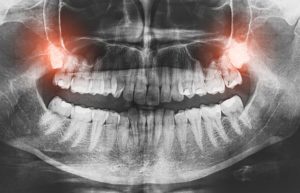
Why do we take out wisdom teeth? Wisdom teeth, also known as third molars, are the most frequently problematic types of teeth. By the time many people reach their late teens and early twenties, they’ve already begun to grow their last four molars. Unlike the other 28 permanent teeth, third molar extractions are done frequently because there’s little room for them to erupt properly on the dental ridge. Because of this, many patients can experience trouble such as tooth impaction, tooth damage, and increasingly more severe tooth pain.
Should I get my third molars extracted? Their penchant for causing trouble and the routine manner in which they’re extracted may make you wonder why we grow 3rd molars in the first place. Coincidentally, you wouldn’t be the first one to question the wisdom of growing third molars, and experts believe the answer lies in how our ancestors used their teeth.
Why are they called wisdom teeth?
The third set of molars typically grows in between the ages of 17 and 25. This used to be referred to as the age of wisdom, hence the nickname “wisdom teeth.” Many people also consider their development a rite of passage of sorts, since they don’t begin to erupt until early adulthood.
Why do they hurt so often?
Because they’re the last teeth to develop, wisdom teeth come at a time when your smile is already full. However, just because wisdom teeth don’t have room to grow doesn’t mean they stop trying. Even when impacted by other molars, third molars will continue to push against them, causing your teeth, gums, and the surrounding jawbone to ache.
Does everybody need third molar extractions?
The only way to stop impacted wisdom teeth from hurting and damaging your other teeth is to extract them. In many cases, patients choose to extract wisdom teeth before they start to cause trouble, helping them avoid the need for more restorative treatment. While not everyone needs 3rd molar extraction, the extra molars aren’t necessary for your bite’s balance, and extracting them can more beneficial to your oral health.
How Our Teeth and Jaws Have Evolved
The typical adult mouth contains several different kinds of teeth. Incisors and canines tear and rip into food, while bicuspids and molars process food further by grinding and pulverizing it before you swallow. Today, four sets of two molars at the back of the mouth usually suffice to process food; however, our ancestors’ diets were much rougher than anything on most of today’s menus. Raw meat and vegetation required incredible chewing power, which could only have been supplied with the additional set of molars we now call wisdom teeth. With a softer diet, the use of fire to cook our food, and improved eating utensils, 3rd molars have become obsolete and cause more inconvenience than benefit.
Why Do Wisdom Teeth Become Impacted?
As third molars try to find their place on your dental ridge, they may become hindered by the limited space, pushing against your second set of molars and damaging nearby teeth. Wisdom tooth extraction is often needed to stop the disturbance from destroying a patient’s dental health, and to relieve what can be debilitating discomfort resulting from the impaction. If your wisdom teeth hurt, or if you’re wondering whether or not you should remove your third molars before they have a chance to hurt, then speak with your dentist about your options for third molar extraction.
Learn more about why we take out wisdom teeth?
Often, third molars are extracted before they even begin to cause problems, which can help patients avoid the serious complications that can arise from impacted molars. If you have one or more wisdom teeth that are giving your trouble, then speak with your dentist to find out if you should have them extracted. To learn how you can treat it and save your teeth, schedule a consultation by calling us at 847-234-0517.
We proudly serve residents of Chicago and all surrounding communities.
